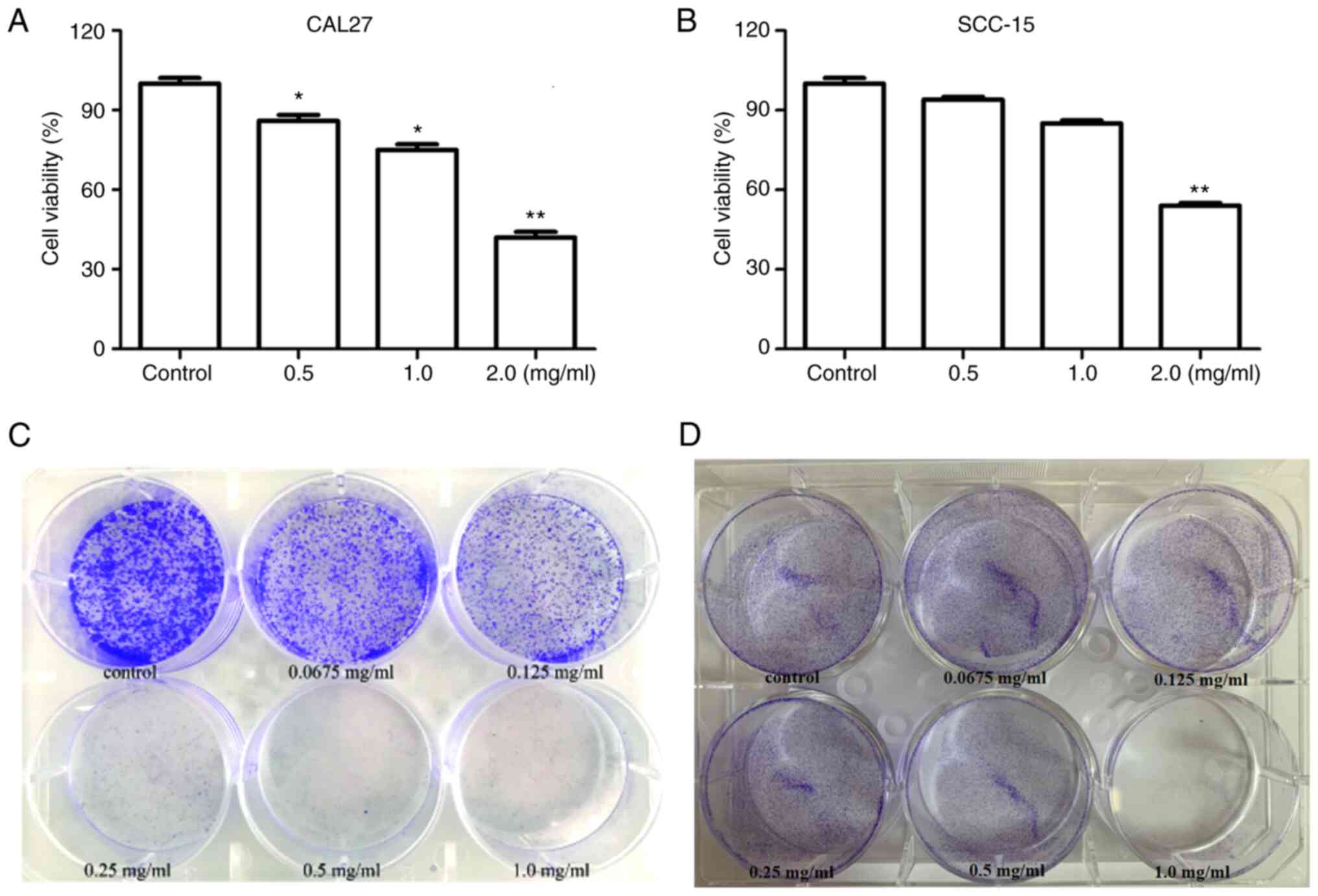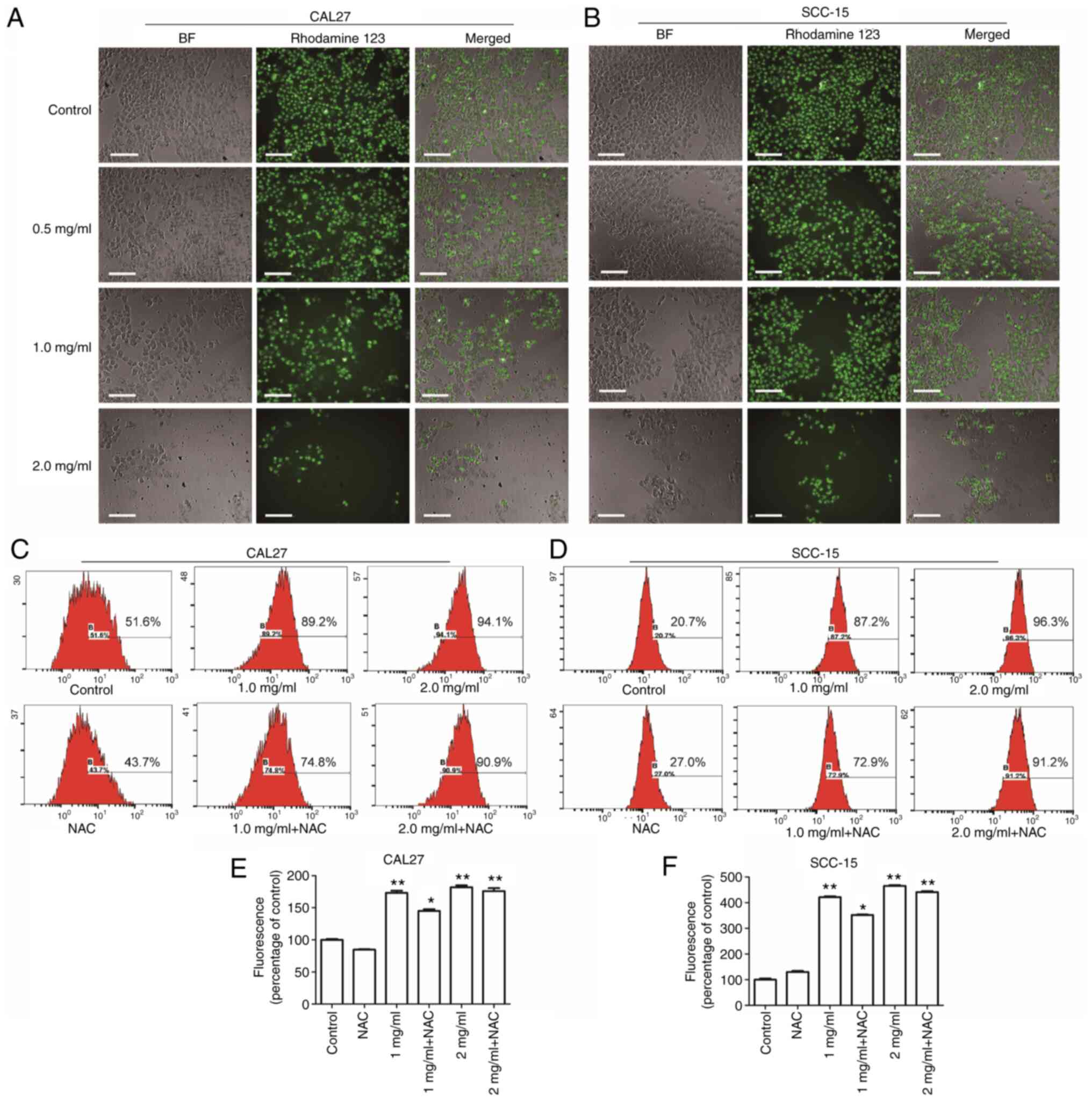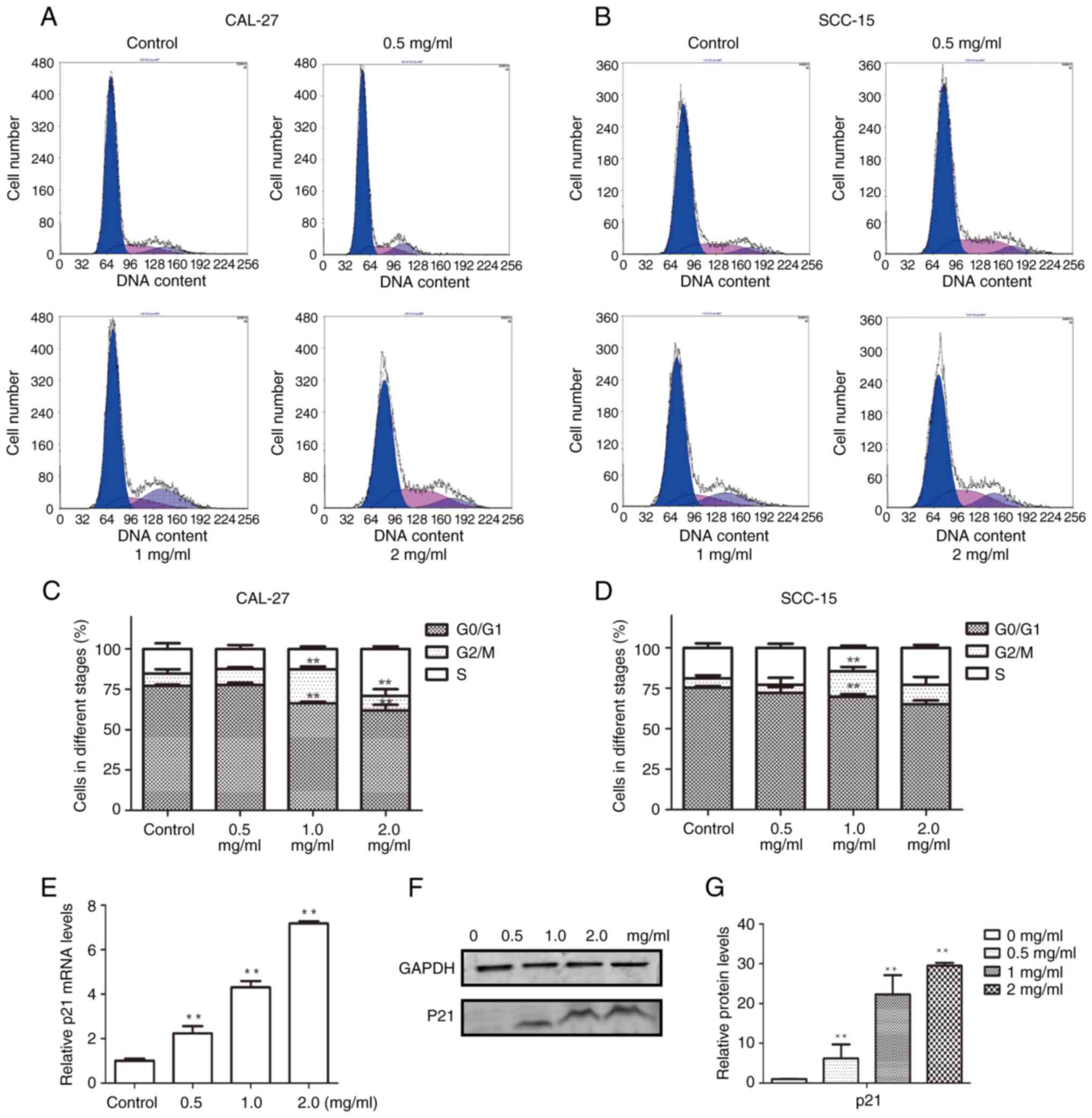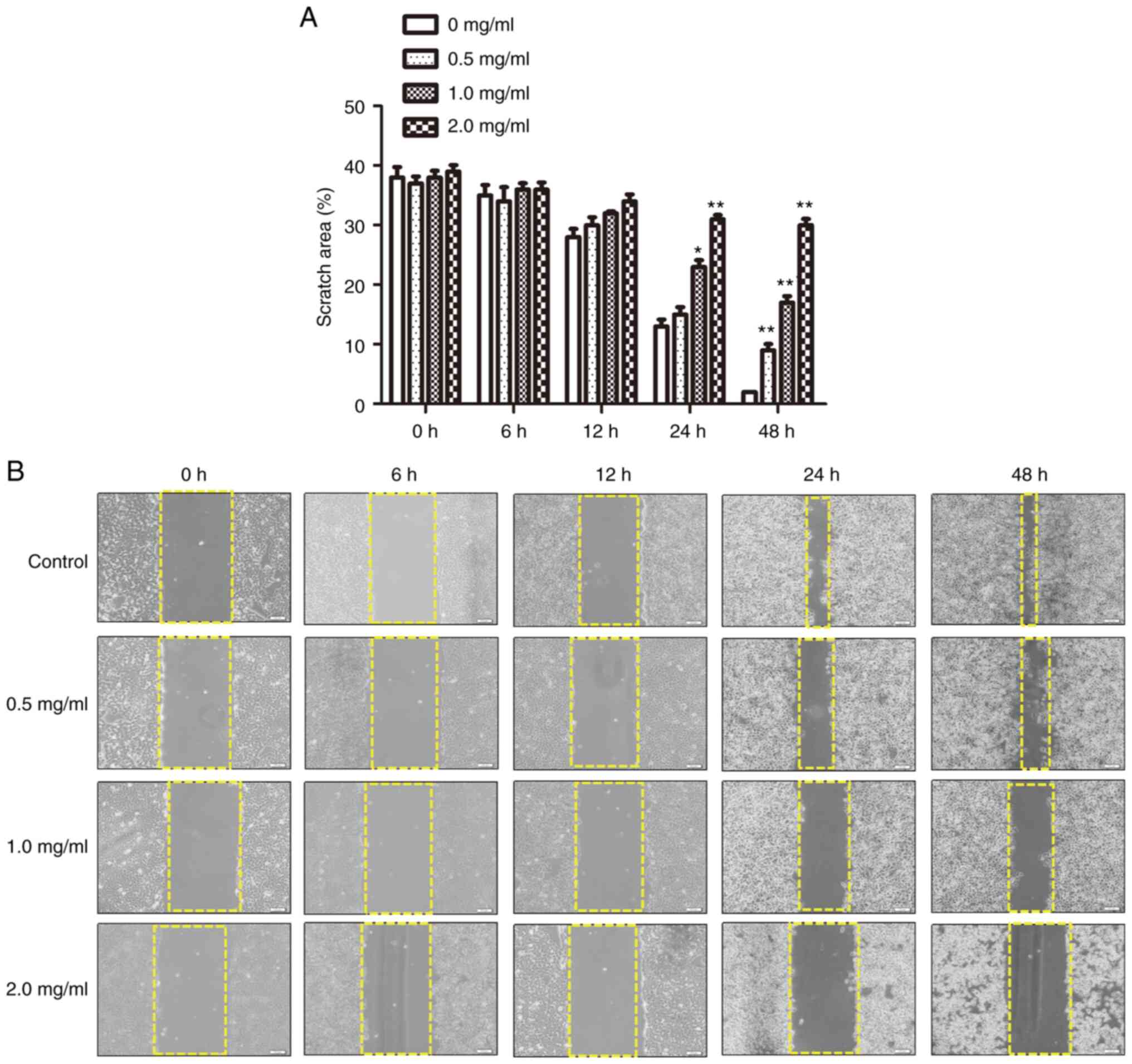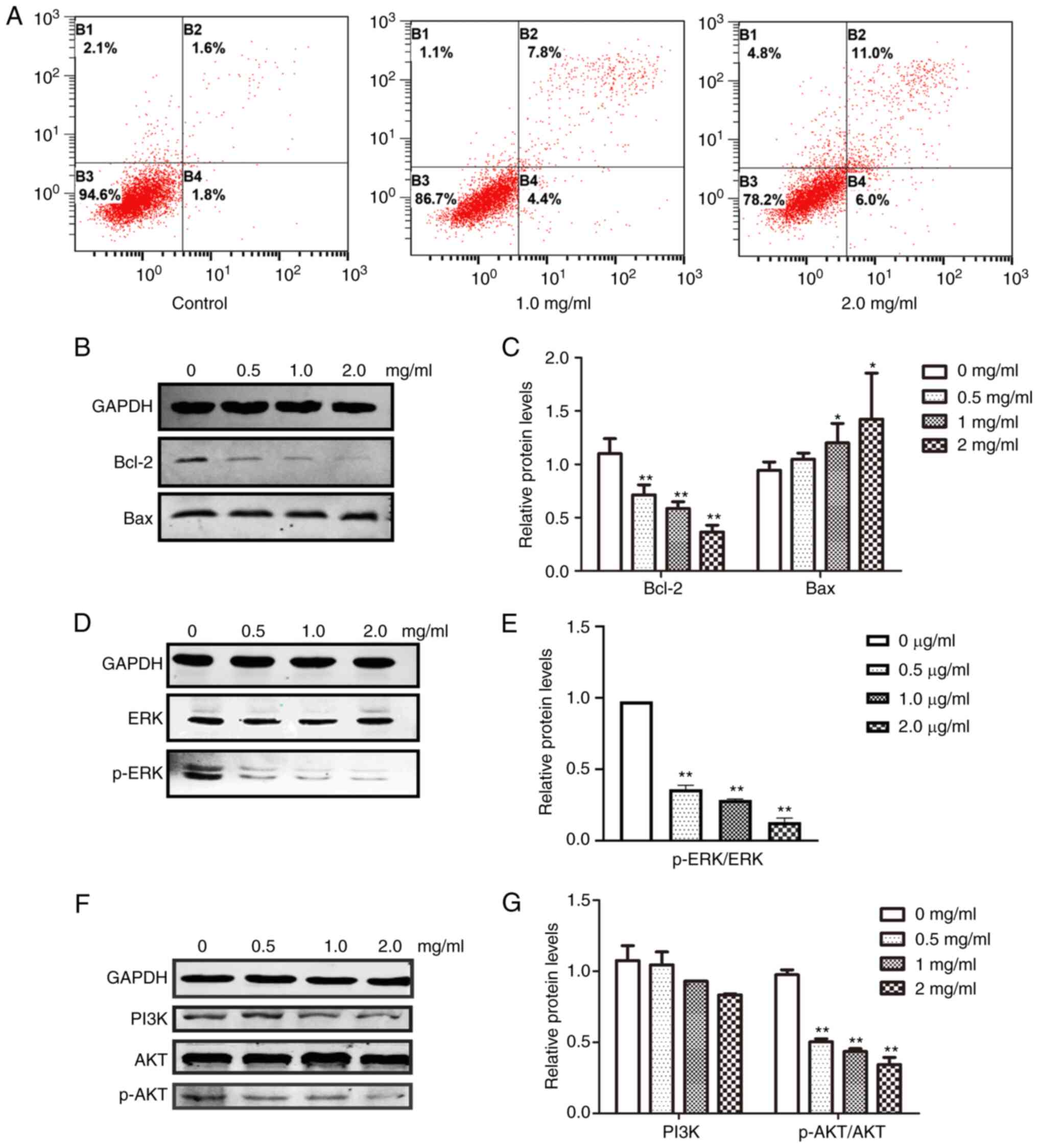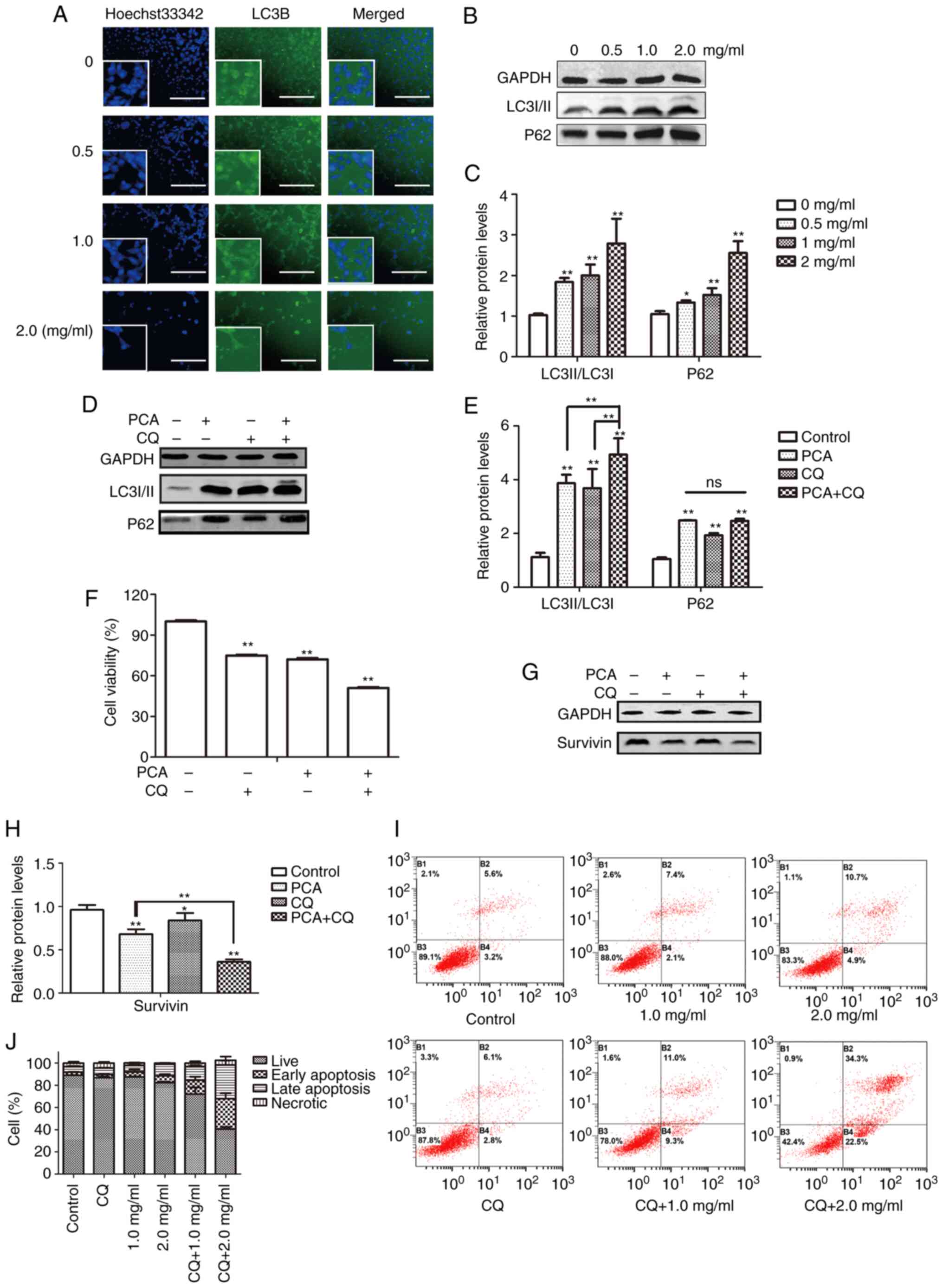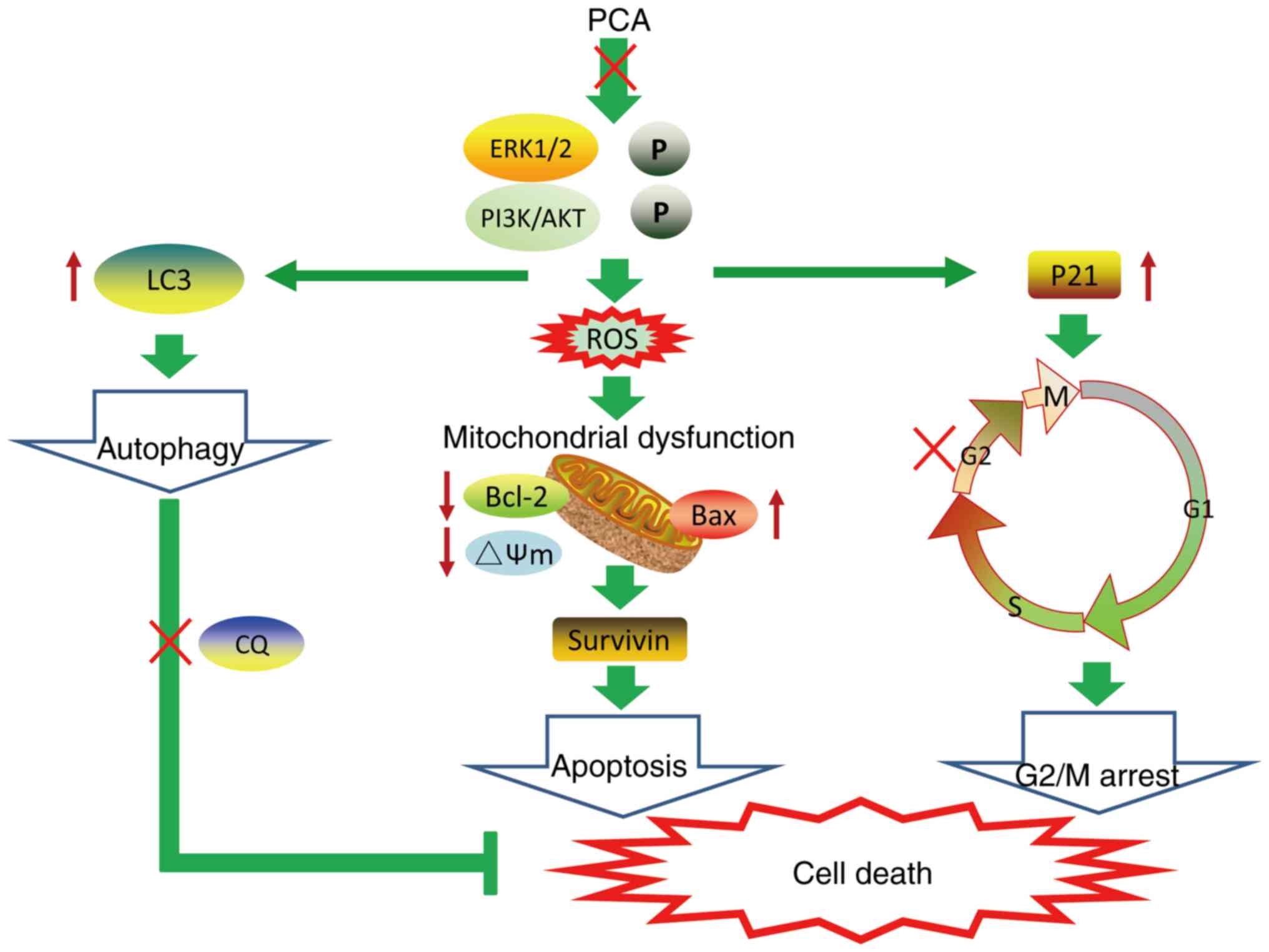|
1
|
Omura K: Current status of oral cancer
treatment strategies: Surgical treatments for oral squamous cell
carcinoma. Int J Clin Oncol. 19:423–430. 2014. View Article : Google Scholar : PubMed/NCBI
|
|
2
|
Tampa M, Mitran MI, Mitran CI, Sarbu MI,
Matei C, Nicolae I, Caruntu A, Tocut SM, Popa MI, Caruntu C and
Georgescu SR: Mediators of inflammation-A potential source of
biomarkers in oral squamous cell carcinoma. J Immunol Res.
12:10617802018.PubMed/NCBI
|
|
3
|
Lien JC, Lin MW, Chang SJ, Lai KC, Huang
AC, Yu FS and Chung JG: Tetrandrine induces programmed cell death
in human oral cancer CAL 27 cells through the reactive oxygen
species production and caspase-dependent pathways and associated
with beclin-1-induced cell autophagy. Environ Toxicol. 32:329–343.
2017. View Article : Google Scholar : PubMed/NCBI
|
|
4
|
Ng JH, Iyer NG, Tan MH and Edgren G:
Changing epidemiology of oral squamous cell carcinoma of the
tongue: A global study. Head Neck. 39:297–304. 2017. View Article : Google Scholar : PubMed/NCBI
|
|
5
|
Chu H, Li Z, Gan Z, Yang Z, Wu Z and Rong
M: LncRNA ELF3-AS1 is involved in the regulation of oral squamous
cell carcinoma cell proliferation by reprogramming glucose
metabolism. Onco Targets Ther. 12:6857–6863. 2019. View Article : Google Scholar : PubMed/NCBI
|
|
6
|
Tan Y, Wang Z, Xu M, Li B, Huang Z, Qin S,
Nice EC, Tang J and Huang C: Oral squamous cell carcinomas: State
of the field and emerging directions. Int J Oral Sci. 15:442023.
View Article : Google Scholar : PubMed/NCBI
|
|
7
|
Adelstein D, Gillison ML, Pfister DG,
Spencer S, Adkins D, Brizel DM, Burtness B, Busse PM, Caudell JJ,
Cmelak AJ, et al: NCCN guidelines insights: Head and neck cancers,
version 2.2017. J Natl Compr Canc Netw. 15:761–770. 2017.
View Article : Google Scholar : PubMed/NCBI
|
|
8
|
Mouw KW, Haraf DJ, Stenson KM, Cohen EE,
Xi X, Witt ME, List M, Blair EA, Vokes EE and Salama JK: Factors
associated with long-term speech and swallowing outcomes after
chemoradiotherapy for locoregionally advanced head and neck cancer.
Arch Otolaryngol Head Neck Surg. 136:1226–1234. 2010. View Article : Google Scholar : PubMed/NCBI
|
|
9
|
Li YC, Wang Y, Li DD, Zhang Y, Zhao TC and
Li CF: Procaine is a specific DNA methylation inhibitor with
anti-tumor effect for human gastric cancer. J Cell Biochem.
119:2440–2449. 2018. View Article : Google Scholar : PubMed/NCBI
|
|
10
|
Schumann NAB, Mendonça AS, Silveira MM,
Vargas LN, Leme LO, de Sousa RV and Franco MM: Procaine and
S-Adenosyl-l-Homocysteine affect the expression of genes related to
the epigenetic machinery and change the DNA methylation status of
in vitro cultured bovine skin fibroblasts. DNA Cell Biol. 39:37–49.
2020. View Article : Google Scholar : PubMed/NCBI
|
|
11
|
Villar-Garea A, Fraga MF, Espada J and
Esteller M: Procaine is a DNA-demethylating agent with
growth-inhibitory effects in human cancer cells. Cancer Res.
63:4984–4989. 2003.PubMed/NCBI
|
|
12
|
Tada M, Imazeki F, Fukai K, Sakamoto A,
Arai M, Mikata R, Tokuhisa T and Yokosuka O: Procaine inhibits the
proliferation and DNA methylation in human hepatoma cells. Hepatol
Int. 1:355–364. 2007. View Article : Google Scholar : PubMed/NCBI
|
|
13
|
Li C, Gao S, Li X, Li C and Ma L: Procaine
inhibits the proliferation and migration of colon cancer cells
through inactivation of the ERK/MAPK/FAK pathways by regulation of
RhoA. Oncol Res. 26:209–217. 2018. View Article : Google Scholar : PubMed/NCBI
|
|
14
|
Chen X, Li LY, Jiang JL, Li K, Su ZB,
Zhang FQ, Zhang WJ and Zhao GQ: Propofol elicits autophagy via
endoplasmic reticulum stress and calcium exchange in C2C12 myoblast
cell line. PLoS One. 13:e01979342018. View Article : Google Scholar : PubMed/NCBI
|
|
15
|
Zhao X, Qi T, Kong C, Hao M, Wang Y, Li J,
Liu B, Gao Y and Jiang J: Photothermal exposure of
polydopamine-coated branched Au-Ag nanoparticles induces cell cycle
arrest, apoptosis, and autophagy in human bladder cancer cells. Int
J Nanomedicine. 13:6413–6428. 2018. View Article : Google Scholar : PubMed/NCBI
|
|
16
|
Li X, He S and Ma B: Autophagy and
autophagy-related proteins in cancer. Mol Cancer. 19:122020.
View Article : Google Scholar : PubMed/NCBI
|
|
17
|
Marsh T and Debnath J: Autophagy
suppresses breast cancer metastasis by degrading NBR1. Autophagy.
16:1164–1165. 2020. View Article : Google Scholar : PubMed/NCBI
|
|
18
|
Nosengo N: Can you teach old drugs new
tricks? Nature. 534:314–316. 2016. View
Article : Google Scholar : PubMed/NCBI
|
|
19
|
Sperling CD, Verdoodt F, Aalborg GL,
Dehlendorff C, Friis S and Kjaer SK: Low-dose aspirin use and
endometrial cancer mortality-a Danish nationwide cohort study. Int
J Epidemiol. 49:330–337. 2020. View Article : Google Scholar : PubMed/NCBI
|
|
20
|
Guo CG, Cheung KS, Zhang F, Chan EW, Chen
L, Wong IC and Leung WK: Incidences, temporal trends and risks of
hospitalisation for gastrointestinal bleeding in new or chronic
low-dose aspirin users after treatment for Helicobacter pylori: A
territory-wide cohort study. Gut. 69:445–452. 2020. View Article : Google Scholar : PubMed/NCBI
|
|
21
|
Guardado-Mendoza R, Salazar-López SS,
Álvarez-Canales M, Farfán-Vázquez D, Martínez-López YE,
Jiménez-Ceja LM, Suárez-Pérez EL, Angulo-Romero F, Evia-Viscarra
ML, Montes de Oca-Loyola ML, et al: The combination of linagliptin,
metformin and lifestyle modification to prevent type 2 diabetes
(PRELLIM). A randomized clinical trial. Metabolism. 104:1540542020.
View Article : Google Scholar : PubMed/NCBI
|
|
22
|
Dong TS, Chang HH, Hauer M, Lagishetty V,
Katzka W, Rozengurt E, Jacobs JP and Eibl G: Metformin alters the
duodenal microbiome and decreases the incidence of pancreatic
ductal adenocarcinoma promoted by diet-induced obesity. Am J
Physiol Gastrointest Liver Physiol. 317:G763–G772. 2019. View Article : Google Scholar : PubMed/NCBI
|
|
23
|
Miao ZF, Adkins-Threats M, Burclaff JR,
Osaki LH, Sun JX, Kefalov Y, He Z, Wang ZN and Mills JC: A
Metformin-Responsive metabolic pathway controls distinct steps in
gastric progenitor fate decisions and maturation. Cell Stem Cell.
26:910–925.e6. 2020. View Article : Google Scholar : PubMed/NCBI
|
|
24
|
Chen X, Li K and Zhao G: Propofol Inhibits
HeLa cells by impairing autophagic flux via AMP-Activated Protein
Kinase (AMPK) activation and endoplasmic reticulum stress regulated
by calcium. Med Sci Monit. 24:2339–2349. 2018. View Article : Google Scholar : PubMed/NCBI
|
|
25
|
Sakaguchi M, Kuroda Y and Hirose M: The
antiproliferative effect of lidocaine on human tongue cancer cells
with inhibition of the activity of epidermal growth factor
receptor. Anesth Analg. 102:1103–1107. 2006. View Article : Google Scholar : PubMed/NCBI
|
|
26
|
Ma XW, Li Y, Han XC and Xin QZ: The effect
of low dosage of procaine on lung cancer cell proliferation. Eur
Rev Med Pharmacol Sci. 20:4791–4795. 2016.PubMed/NCBI
|
|
27
|
Chen C, Wang N, Huang T, Cheng G, Hu Y,
Wang B, Zhang Y and Wang C: Chloroprocaine antagonizes progression
of breast cancer by regulating LINC00494/miR-3619-5p/MED19 axis. J
Biochem Mol Toxicol. 38:e235242024. View Article : Google Scholar : PubMed/NCBI
|
|
28
|
Lin AB, McNeely SC and Beckmann RP:
Achieving precision death with cell-cycle inhibitors that target
DNA replication and repair. Clin Cancer Res. 23:3232–3240. 2017.
View Article : Google Scholar : PubMed/NCBI
|
|
29
|
Wang Z, Sturgis EM, Zhang F, Lei D, Liu Z,
Xu L, Song X, Wei Q and Li G: Genetic variants of p27 and p21 as
predictors for risk of second primary malignancy in patients with
index squamous cell carcinoma of head and neck. Mol Cancer.
11:172012. View Article : Google Scholar : PubMed/NCBI
|
|
30
|
Fulda S and Debatin KM: Extrinsic versus
intrinsic apoptosis pathways in anticancer chemotherapy. Oncogene.
25:4798–4811. 2006. View Article : Google Scholar : PubMed/NCBI
|
|
31
|
Pfeffer CM and Singh ATK: Apoptosis: A
target for anticancer therapy. Int J Mol Sci. 19:4482018.
View Article : Google Scholar : PubMed/NCBI
|
|
32
|
Gao W, Wang X, Zhou Y, Wang X and Yu Y:
Autophagy, ferroptosis, pyroptosis, and necroptosis in tumor
immunotherapy. Signal Transduct Target Ther. 7:1962022. View Article : Google Scholar : PubMed/NCBI
|
|
33
|
Levine B and Kroemer G: Autophagy in the
pathogenesis of disease. Cell. 132:27–42. 2008. View Article : Google Scholar : PubMed/NCBI
|
|
34
|
Mizushima N and Komatsu M: Autophagy:
Renovation of cells and tissues. Cell. 147:728–741. 2011.
View Article : Google Scholar : PubMed/NCBI
|
|
35
|
Zhou J, Hu SE, Tan SH, Cao R, Chen Y, Xia
D, Zhu X, Yang XF, Ong CN and Shen HM: Andrographolide sensitizes
cisplatin-induced apoptosis via suppression of
autophagosome-lysosome fusion in human cancer cells. Autophagy.
8:338–349. 2012. View Article : Google Scholar : PubMed/NCBI
|
|
36
|
Okuyama K, Suzuki K, Naruse T, Tsuchihashi
H, Yanamoto S, Kaida A, Miura M, Umeda M and Yamashita S: Prolonged
cetuximab treatment promotes p27Kip1-mediated G1 arrest and
autophagy in head and neck squamous cell carcinoma. Sci Rep.
11:52592021. View Article : Google Scholar : PubMed/NCBI
|
|
37
|
Lamark T, Svenning S and Johansen T:
Regulation of selective autophagy: The p62/SQSTM1 paradigm. Essays
Biochem. 61:609–624. 2017. View Article : Google Scholar : PubMed/NCBI
|
|
38
|
Deng Z, Lim J, Wang Q, Purtell K, Wu S,
Palomo GM, Tan H, Manfredi G, Zhao Y, Peng J, et al:
ALS-FTLD-linked mutations of SQSTM1/p62 disrupt selective autophagy
and NFE2L2/NRF2 anti-oxidative stress pathway. Autophagy.
16:917–931. 2020. View Article : Google Scholar : PubMed/NCBI
|
|
39
|
Mizushima N, Yoshimori T and Levine B:
Methods in mammalian autophagy research. Cell. 140:313–326. 2010.
View Article : Google Scholar : PubMed/NCBI
|
|
40
|
Mizushima N, Yamamoto A, Matsui M, Matsui
M, Yoshimori T, Yoshimori T and Ohsumi Y: In vivo analysis of
autophagy in response to nutrient starvation using transgenic mice
expressing a fluorescent autophagosome marker. Mol Biol Cell.
15:1101–1111. 2004. View Article : Google Scholar : PubMed/NCBI
|
|
41
|
Yang J, Ren X, Zhang L, Li Y, Cheng B and
Xia J: Oridonin inhibits oral cancer growth and PI3K/Akt signaling
pathway. Biomed Pharmacother. 100:226–232. 2018. View Article : Google Scholar : PubMed/NCBI
|















